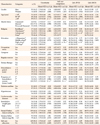2. Shona SP, Ajay S. Approach to patients with chronic kidney disease, Stage 1-4. In : John TD, Peter GB, Todd SI, editors. Handbook of Dialysis. 5th ed. San Francisco, CA: Jossery-Bass;2014. p. 3–13.
3. Chiou CP, Chung YC. Effectiveness of multimedia interactive patient education on knowledge, uncertainty and decision-making in patients with end-stage renal disease. Journal of Clinical Nursing. 2012; 21(9-10):1223–1231. DOI:
10.1111/j.1365-2702.2011.03793.x.


4. Jang HS, Lee CS, Yang YH. Influence of uncertainty and uncertainty appraisal on self-management in hemodialysis patients. Journal of Korean Academy of Nursing. 2015; 45(2):271–279. DOI:
10.4040/jkan.2015.45.2.271.


5. Cho YM, Yum KS. The relationship between of uncertainty, depression, physiologic index and basic psychological need of hemodialysis patients. Journal of Digital Convergence. 2017; 15(10):281–291. DOI:
10.14400/JDC.2017.15.10.281.
7. Yang NY, Kim MJ. Concept analysis of uncertainty related to illness. Journal of Korean Gerontological Nursing. 2002; 4(2):187–194.
8. Orem DE. Nursing: Concepts of practice. 6th ed. St. Louis: Mosby;2001. p. 20–22.
9. Han KH, Kim MH. A Study on relationships between hope, self-care efficacy in hemodialysis patients. The Korean Journal of Rehabilitation Nursing. 2001; 4(2):137–145.
10. Yun SJ, Lee YH. Factors influencing uncertainty in dialysis patient by duration of dialysis. Korean Journal of Adult Nursing. 2012; 24(6):597–606. DOI:
10.7475/kjan.2012.24.6.0597.

11. Kaba E, Bellou P, Iordanou P, Andrea S, Kyritsi E, Gerogianni G, et al. Problems experienced by hemodialysis patients in Greece. British Journal of Nursing. 2007; 16(14):868–872.

12. Morsch CM, Goncalves LF, Barros E. Health-related quality of life among hemodialysis patients-relationship with clinical indicators, morbidity and mortality. Journal of Clinical Nursing. 2006; 15(4):498–504.

13. Kimmel PL, Patel SS. Quality of life in patients with chronic kidney disease: focus on end-stage renal disease treated with hemodialysis. Seminars in Nephrology. 2006; 26:68–79.


14. Lee MH, Song MS, Yoo KM. Relationship among powerlessness self-efficacy and quality of life in hemodialysis patients. The Korean Journal of Rehabilitation Nursing. 2002; 5(2):166–179.
15. Oh HS. Theory construction in nursing of uncertainty. Korean Journal of Adult Nursing. 2001; 13(2):200–207.
16. Lee MJ. Uncertainty, appraisal of uncertainty and health-related quality of life in recovering clients discharged from hospital after CABG. Ewha Journal of Nursing Science. 2009; 21(1):49–63.
17. Park GY. Study on the hope, resilience, ability to self-care, and quality of life of hemodialysis patients [dissertation]. Seoul: Hanyang University;2016.
18. Heidarzadeh M, Atashpeikar S, Jalilazar T. Relationship between quality of life and self-care ability in patients receiving hemodialysis. Iranian Journal of Nursing and Midwifery Research. 2010; 15(2):71–76.


19. Kwon GS, Lim KH. Mediating effects of depression and social supports between type D personality and quality of life on hemodialysis patients. Korean Journal of Adult Nursing. 2019; 31(4):439–448. DOI:
10.7475/kjan.2019.31.4.439.

20. Chung CW, Kim MJ, Rhee MH, Do HG. Functional status and psychosocial adjustment in gynecologic cancer patients receiving chemotherapy. Korean Journal of Women Health Nursing. 2005; 11(1):58–66. DOI:
10.4069/kjwhn.2005.11.1.58.

21. Geder E, Taylor S. Self-as-carer: a preliminary evaluation. In : in proceedings of the seventh annual nursing research conference, MO: University of Missouri-Columbia School of Nursing; 1988.
22. So HS. Testing construct validity of self-as-carer inventory and its predictors. Korean Journal of Adult Nursing. 1992; 4(2):147–161.
23. Ware JE, Kosinski M, Keller SD. A 12-Item Short-Form Health Survey: construction of scales and preliminary tests of reliability and validity. Medical Care. 1996; 34(3):220–233.

24. Baron RM, Kenny DA. The moderator-mediator variable distinction in social psychological research: conceptual, strategic, and statistical considerations. Journal of Personality and Social Psychology. 1986; 51(6):1173–1182. DOI:
10.1037/0022-3514.51.6.1173.


25. Kang SK. Study on the physical symptoms, uncertainty, resilience, and self-care competency of hemodialysis patients [dissertation]. Busan: Inje University;2018.
26. Kim YJ, Choi HJ. The influence of uncertainty and social support on general well-being among hemodialysis patients. The Korean Journal of Rehabilitation Nursing. 2012; 15(1):20–29. DOI:
10.7587/kjrehn.2012.20.

27. Park GY. Study on the hope, resilience, ability to self-care, and quality of life of hemodialysis patients [dissertation]. Seoul: Hanyang University;2016.
28. Cha JE, Yi MS. Relationships between treatment belief, personal control, depressive mood and health-related quality of life in patients with hemodialysis. Korean Journal of Adult Nursing. 2014; 26(6):693–702. DOI:
10.7475/kjan.2014.26.6.693.

29. Yoon MY. Predicting factors of self-esteem in patients with hemodialysis. Journal of Digital Convergence. 2018; 16(8):253–261. DOI:
10.14400/JDC.2018.16.8.253.
30. Perl J, Karaboyas A, Morgenstern H, Sen A, Rayner HC, Vanholder RC, et al. Association between changes in quality of life and mortality in hemodialysis patients: results from the DOPPS. Nephrol Dial Transplant. 2017; 32(3):521–527. DOI:
10.1093/ndt/gfw233.


31. Park YJ, Lee HJ. The levels of physical activity and its relationships with depression, health-related quality of life, sleep disturbance, and physiological indicators in hemodialysis patients. Korean Journal of Adult Nursing. 2015; 27(6):718–727. DOI:
10.7475/kjan.2015.27.6.718.

32. Kim EY, Kim JS. Predictors of quality of life among hemodialysis patients. Korean Journal of Adult Nursing. 2004; 16(4):597–607.
33. Suck YM, Park JW, Jeon MJ, Kim CY. Effect of periodic video education on knowledge about hemodialysis, patient role behavior and the physiologic index in patients with hemodialysis. Journal of Korean Biological Nursing Science. 2013; 15(3):122–132. DOI:
10.7586/jkbns.2013.15.3.122.







 PDF
PDF ePub
ePub Citation
Citation Print
Print





 XML Download
XML Download